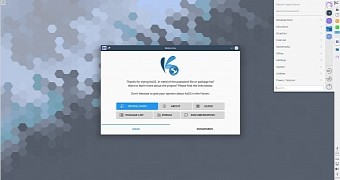The development team behind the KaOS Linux distribution announced the availability of the October 2018 snapshot with the latest version of the KDE Plasma desktop environment and numerous other updated components.
Powered by the latest Linux 4.18 kernel, KaOS 2018.10 ships with the recently released KDE Plasma 5.14 desktop environment by default, along with the latest KDE Frameworks 5.51.0 and KDE Applications 18.08.2 software suites, all built against the Qt 5.11.2 open-source and cross-platform software development framework.
KaOS 2018.10 also updates the toolchain, which is now based on GNU C Library (Glibc) 2.27 and GCC (GNU Compiler Collection) 7.3.1. Numerous packages were rebuilt in this release due to the Boost, Protobuf, ICU (62.1), Qt, x265, and Net-SNMP core components being updated as well to their latest versions in this new snapshot.
Also included are the latest Wayland 1.16.0 display server, GStreamer 1.14.4 multimedia framework, Mesa 18.2.2 graphics stack, NetworkManager 1.14.0 network connection manager, systemd 239 init system, GNU Nano 3.1 text editor, Bison 3.1 parser generator, Apache 2.4.35 web server, and Rust 1.29.1 programming language.
KaOS Linux now shipping with the latest Calamares 3.2 installer
Introduced in the previous snapshot, the latest Calamares 3.2 universal installer framework is now shipped as default graphical installer with each new KaOS Linux snapshot, including KaOS 2018.10, which those who want to give it a try or install it on new computers can download KaOS 2018.10 right now through our software portal.
Existing KaOS Linux users don't need to download the new snapshot to keep their installations up-to-date and receive the new features and updated components. Simply fire up a terminal emulator and execute the "sudo pacman -Syu" command to update your KaOS computer, similar to how Arch Linux systems are being updated.
Unfortunately, this release of KaOS Linux does not come without issues, as the developers warn users that they won't be able to install the operating system on RAID. Also, please note that the KaOS ISO image doesn't support the Unetbootin and Rufus utilities to create live USB systems.

 14 DAY TRIAL //
14 DAY TRIAL //